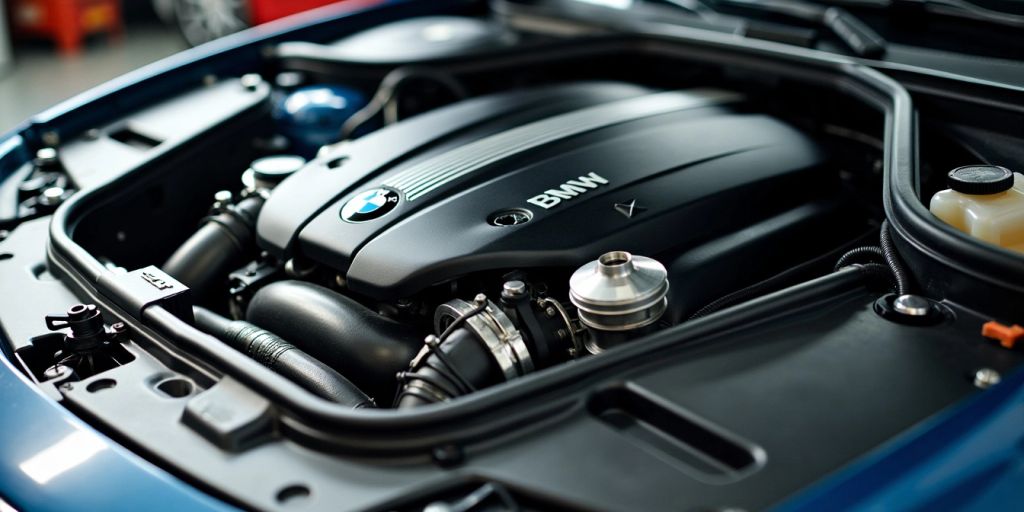
Essential Tips for BMW Auto Repair: Keeping Your Luxury Vehicle in Top Shape
Owning a BMW is a rewarding experience, but it also comes with the responsibility of keeping it in great shape. Regular maintenance and care are essential to ensure that your luxury vehicle performs well and lasts for many years. Here are some essential tips that every BMW owner should know to keep their car running smoothly and efficiently.
Key Takeaways
- Follow the recommended maintenance schedule to avoid costly repairs.
- Listen to your car for warning signs and address them quickly.
- Regular oil changes are crucial for engine health.
- Choose a certified mechanic who specializes in BMWs for repairs.
- Use genuine BMW parts to ensure the best performance.
Understanding Your BMW’s Maintenance Schedule

BMW Auto Repair
Keeping your BMW in great shape goes beyond just driving it. It’s essential to understand and follow the maintenance schedule that BMW has created. This schedule is important because it tells you when to perform different services to keep your car reliable and safe. Regular maintenance not only fixes problems but also prevents them, saving you from expensive repairs later on and helping your BMW hold its value over time.
Regular Service Intervals
BMW vehicles are built to last, but they need regular care. The maintenance schedule is not just a suggestion; it’s a plan made by BMW engineers who know what your car needs. By following this schedule, you ensure that every part of your car works well together. Here are some key points to remember:
- Condition Based Service (CBS): This system monitors your car’s parts and fluids, letting you know when maintenance is needed.
- Inspection I and II: These are major check-ups that happen at around 30,000 and 60,000 miles, respectively.
- Lifetime Fluids: Some fluids are designed to last a long time, but they still need to be checked periodically.
Importance of Following the Schedule
Following the maintenance schedule is crucial for keeping your BMW running smoothly. Here’s why:
- Prevents Major Issues: Regular checks can catch small problems before they become big ones.
- Enhances Performance: A well-maintained BMW performs better and is more enjoyable to drive.
- Safety First: Regular maintenance ensures that your car is safe to drive, protecting you and your passengers.
How to Keep Track of Maintenance
Keeping track of your BMW’s maintenance can be easy if you follow these steps:
- Use a Maintenance Log: Write down when services are done and what was completed.
- Set Reminders: Use your phone or calendar to remind you of upcoming services.
- Check the CBS System: Pay attention to alerts from the Condition Based Service system.
Regular maintenance is the best way to keep your BMW running like new. It helps avoid costly repairs and ensures your car remains safe and reliable for years to come.
By understanding your BMW’s maintenance schedule, you can keep your luxury vehicle in top shape and enjoy the driving experience it offers.
Common BMW Issues and How to Address Them

Engine Problems
Engine issues can be a major concern for BMW owners. Regular maintenance can help prevent these problems. Here are some common engine issues:
- Oil Leaks: Check for oil spots under your car. If you notice any, it’s time to get it checked.
- Overheating: If your engine temperature gauge rises, stop driving immediately to avoid damage.
- Check Engine Light: Don’t ignore this warning. Have it diagnosed as soon as possible.
Electrical System Failures
Electrical problems can affect various systems in your BMW. Here are some signs to watch for:
- Dimming Lights: If your headlights or dashboard lights dim, it could indicate a battery issue.
- Malfunctioning Electronics: If your infotainment system or navigation fails, it may need a reset or repair.
- Battery Issues: A weak battery can lead to starting problems. Check it regularly, especially if it’s over three years old.
Transmission Troubles
Transmission issues can be costly if not addressed quickly. Here’s what to look for:
- Slipping Gears: If your car unexpectedly changes gears, it’s a sign of trouble.
- Delayed Shifting: If there’s a noticeable delay when shifting from park to drive, have it checked.
- Fluid Leaks: Check for red fluid under your car, which could indicate a transmission leak.
Regular inspections can help catch these issues early, saving you time and money in the long run.
For expert advice on BMW 3 blems, call our specialist European car mechanics today!
Choosing the Right Mechanic for Your BMW
When it comes to maintaining your BMW, finding the right mechanic is crucial. A good repair shop should explain the problem with your car, what repairs are needed, and provide a precise cost estimate. Transparency is key.
Certified BMW Technicians
- Specialized Knowledge: Certified BMW technicians have specific training on BMW vehicles, ensuring they understand the unique systems of your car.
- Access to Latest Tools: They use advanced diagnostic tools designed for BMWs, which helps in quickly identifying issues.
- Better Resale Value: Cars serviced by certified technicians often have a higher resale value, as buyers prefer vehicles with a documented service history.
Questions to Ask Your Mechanic
- Are you certified to work on BMWs?
- What kind of warranty do you offer on repairs?
- Can you provide a detailed estimate before starting work?
Benefits of Specialized BMW Service Centers
- Expertise: These centers focus solely on BMWs, ensuring that your vehicle receives the best care.
- Quality Parts: They typically use genuine BMW parts, which are essential for maintaining performance.
- Customer Support: Specialized centers often provide better customer service, as they understand the needs of BMW owners.
Choosing the right mechanic can save you time and money in the long run. Make sure to do your research and ask the right questions to ensure your BMW gets the care it deserves.
Essential Tools and Equipment for DIY BMW Repairs
When it comes to maintaining your BMW, having the right tools is crucial. Here are some essential tools every BMW owner should have:
Basic Tools Every BMW Owner Should Have
- Wrenches: A set of metric wrenches is essential for most repairs.
- Screwdrivers: Both flathead and Phillips screwdrivers are necessary for various tasks.
- Jack and Jack Stands: To safely lift your vehicle for tire changes or undercarriage work.
Advanced Diagnostic Tools
- OBD-II Scanner: This tool helps you read error codes from your car’s computer, making it easier to diagnose issues.
- Multimeter: Useful for checking electrical systems and battery health.
- Torque Wrench: Ensures that bolts are tightened to the correct specifications, which is vital for engine work.
Safety Equipment and Precautions
- Safety Glasses: Protect your eyes from debris while working.
- Gloves: Keep your hands clean and safe from sharp objects.
- Fire Extinguisher: Always have one nearby when working on your vehicle.
Keeping your BMW in top shape requires the right tools and a commitment to regular maintenance. Investing in quality tools can save you time and money in the long run.
By having these tools on hand, you can tackle many common maintenance tasks yourself, ensuring your BMW stays in excellent condition. Remember, regular maintenance is key to avoiding costly repairs down the line!
Tips for Extending the Lifespan of Your BMW
Proper Driving Habits
To keep your BMW in great shape, drive carefully. Avoid sudden stops and starts, and don’t speed. Here are some tips:
- Brake slowly and gradually.
- Don’t hit bumps like you’re on a rollercoaster.
- Follow speed limits to reduce wear on your engine.
Regular Cleaning and Detailing
Keeping your BMW clean is essential. Regular washes help protect the paint and prevent rust. Here’s what to do:
- Wash your car every two weeks.
- Wax it every two months to maintain a shiny finish.
- Use protectants on the interior surfaces.
Using Quality Parts and Fluids
Always use high-quality parts and fluids for your BMW. This can make a big difference in performance and longevity. Consider:
- Using OEM parts for better compatibility.
- Regularly checking and replacing fluids like oil and coolant.
- Following the manufacturer’s guidelines for maintenance.
Regular maintenance is key to keeping your BMW running smoothly. By following these tips, you can help ensure your vehicle lasts for many years to come!
Understanding BMW Warranty and Insurance Options
When you own a BMW, understanding your warranty and insurance options is crucial for protecting your investment. Here’s what you need to know:
Types of Warranties Available
- Basic Warranty: Covers most repairs for a specific period or mileage.
- Powertrain Warranty: Focuses on the engine, transmission, and drivetrain components.
- Extended Warranty: Offers additional coverage beyond the basic warranty, lasting up to seven years or 100,000 miles.
What to Look for in an Insurance Policy
- Coverage Limits: Ensure your policy covers the full value of your BMW.
- Deductibles: Choose a deductible that fits your budget.
- Additional Benefits: Look for perks like roadside assistance or rental car coverage.
How to File a Claim
- Contact Your Insurer: Notify them about the incident as soon as possible.
- Gather Documentation: Collect all necessary documents, including photos and police reports if applicable.
- Follow Up: Keep in touch with your insurer to ensure your claim is processed smoothly.
Understanding your warranty and insurance options can save you from unexpected costs and ensure your BMW remains in top condition. Being informed is key!
The Importance of Using Genuine BMW Parts
When it comes to maintaining your BMW, using genuine parts is crucial for several reasons. Here’s why you should always opt for OEM (Original Equipment Manufacturer) parts:
Benefits of OEM Parts
- Quality Assurance: OEM parts are made specifically for your BMW, ensuring a perfect fit and optimal performance.
- Warranty Protection: Using non-OEM parts can void your warranty, leading to unexpected repair costs.
- Resale Value: Vehicles serviced with genuine parts tend to have a higher resale value. Potential buyers often prefer cars that have been maintained with original parts.
Risks of Aftermarket Parts
- Compatibility Issues: Aftermarket parts may not fit correctly, leading to performance problems.
- Quality Concerns: These parts might not meet the same standards as OEM parts, which can affect your vehicle’s reliability.
- Warranty Voidance: Using non-genuine parts can void your warranty, leaving you responsible for repairs.
Where to Purchase Genuine BMW Parts
- Authorized Dealerships: Always a reliable source for OEM parts.
- Certified BMW Service Centers: They often have access to genuine parts and can provide installation services.
- Reputable Online Retailers: Ensure they are authorized to sell OEM parts.
Using genuine BMW parts is not just about quality; it’s about ensuring your vehicle remains in top shape and retains its value. Investing in OEM parts can save you money in the long run.
Conclusion
Taking care of your BMW is not just about keeping it clean; it’s about making sure it runs well for a long time. By following the tips we discussed, like regular oil changes and checking your tires, you can save money and avoid big repairs later. Remember, listening to your car and paying attention to warning signs can help you catch small problems before they become serious. If you ever feel unsure, don’t hesitate to ask a professional mechanic for help. With a little effort, you can enjoy your luxury vehicle for many years to come!
Frequently Asked Questions
How often should I change the oil in my BMW?
It’s best to change the oil every 10,000 miles or once a year, whichever comes first. Check your owner’s manual for specifics.
What are common issues with BMWs?
Some common problems include engine issues, electrical failures, and transmission troubles. Regular maintenance can help prevent these.
How can I find a good mechanic for my BMW?
Look for certified BMW technicians and ask them questions about their experience with your model. Specialized BMW service centers are also a great choice.
What tools do I need for basic BMW repairs?
Every BMW owner should have basic tools like wrenches, screwdrivers, and a tire jack. Advanced diagnostic tools can also be helpful.
What can I do to extend the life of my BMW?
Practice good driving habits, keep your car clean, and use quality parts and fluids to help your BMW last longer.
Why should I use genuine BMW parts?
Genuine BMW parts ensure better performance and safety. Aftermarket parts may not fit as well and could lead to problems down the line.

